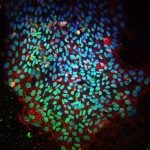Link to Pubmed [PMID] – 23680492
Semin. Cell Dev. Biol. 2013 Aug-Sep;24(8-9):627-42
The semi-conservative nature of DNA replication has suggested that identical DNA molecules within chromatids are inherited by daughter cells after cell division. Numerous reports of non-random DNA segregation in prokaryotes and eukaryotes suggest that this is not always the case, and that epigenetic marks on chromatids, if not the individual DNA strands themselves, could have distinct signatures. Their selective distribution to daughter cells provides a novel mechanism for gene and cell fate regulation by segregating chromatids asymmetrically. Here we highlight some examples and potential mechanisms that can regulate this process. We propose that cellular asymmetry is inherently present during each cell division, and that it provides an opportunity during each cell cycle for moderating cell fates.

